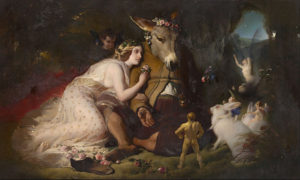“We know the scene.” The strange one begins to tell a story by the fire, mumbling, miming, chanting, swaying, and no one pays attention, but she keeps going and there is something about the quiet insistence of her song as it grows louder that makes the old woman, grinding ocher, look up. The men, scraping hides, one by one let the flint fall and find stones to sit on. Others notice the group and gather.
They were not like this before; the story has brought them together. In the warmth of the fire, they lean toward the storyteller, who is one of them, yet an outsider: she has gone away for a long time, she is crippled, or she is crazy. Perhaps she is a man.16 She tells them of the beginning of the world, the birth of the first people, the coming together of a culture, the origin of language and storytelling – a tale they all know, but only she has “the gift, the right, or the duty to tell” it (43), writes French philosopher and literary critic Jean-Luc Nancy in “Myth Interrupted” (1991).
Continue reading “The Myth of Myths: The Development of Human Culture through Mythmaking”
 In William Shakespeare’s A Midsummer Night’s Dream, the word “dream” appears repeatedly, sometimes referring to actual dreams, the fantastical night in the forest, plays, which are dreams upon a stage, and love, which seems to be a passing fancy.
In William Shakespeare’s A Midsummer Night’s Dream, the word “dream” appears repeatedly, sometimes referring to actual dreams, the fantastical night in the forest, plays, which are dreams upon a stage, and love, which seems to be a passing fancy.




